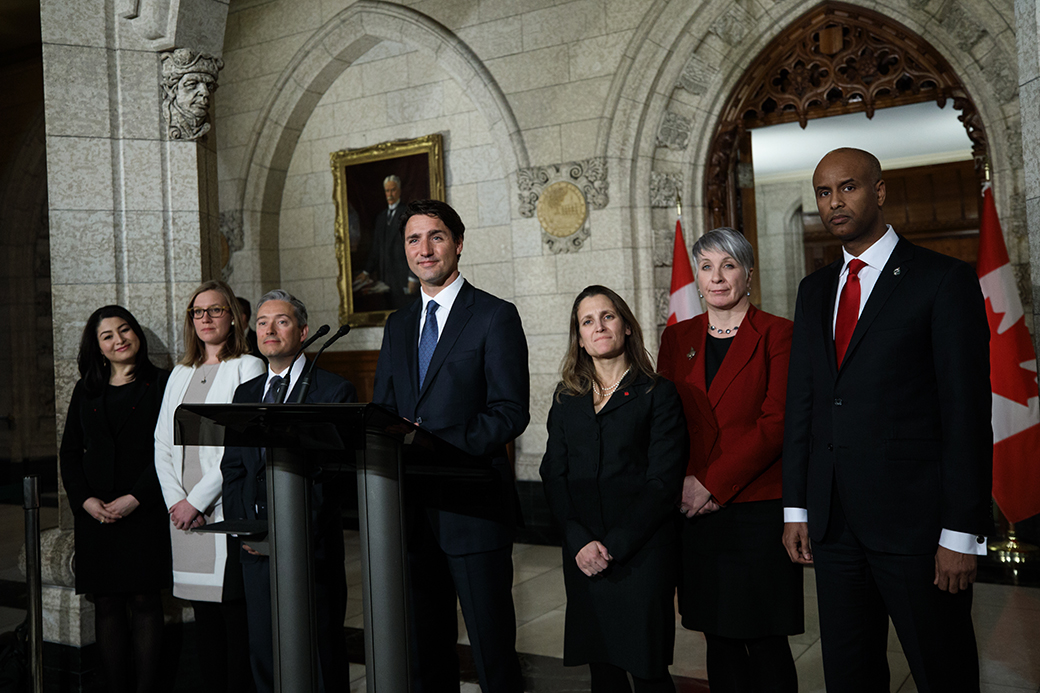Karl Nerenberg is your reporter on the Hill. Please consider supporting his work with a monthly donation Support Karl on Patreon today for as little as $1 per month!
The NDP’s and Amnesty Canada’s suggestion that Canada should suspend its designation of the U.S. as a safe country for refugees makes obvious sense.
President Trump has suspended all refugee admissions, from all countries in the world whether Muslim or not, for four months. That means the U.S. is, by definition, not a safe country for anyone seeking refugee status.
Refugees from countries other than the U.S., who try to get to Canada through the U.S., are penalized by what is called the safe third country agreement, which the previous Liberal government signed with the U.S., in 2002.
By that agreement, both countries recognize each other as safe, and automatically return any would-be refugees who seek to transit through one to the other.
That agreement makes no sense now, since the U.S. will accept zero refugees, at least for the time being, and perhaps for quite some time.
There is, as well, another broader, and more recent, Canadian refugee provision with which the Trudeau government must now deal, and quickly.
It is the safe designated country of origin rule, which applies to all people who seek refugee status in Canada, either by coming here directly or through another country.
The current government has been actively considering getting rid of the safe country designation entirely. There are credible reports to the effect that when John McCallum was still the minister of immigration the government had been preparing legislation to that effect, as part of a larger refugee law package.
The Trudeau government and its new immigration and refugees minister, Ahmed Hussen, should now consider moving quickly on those legislative changes.
A Harper initiative passed in the face of massive contrary evidence
The safe country of origin provision has only been part of Canadian refugee law since 2012. It was a key feature of a major overhaul of refugee practices and rules which Stephen Harper’s star minister, Jason Kenney, called, oxymoronically, the “Protecting Canada’s Immigration System Act.”
Kenney promoted the view that a great many of those who seek asylum in Canada are, in fact, queue jumpers. Kenney claimed they use the refugee route to by-pass the slow and laborious immigration process. He pointed, repeatedly, to the thousands of east and central European Roma (or, if you will, Gypsy) who had been claiming refugee status for more than a decade, many of them successfully.
Roma may be poor and victims of social and economic discrimination, Kenney averred, but they come from, in his words, liberal-democratic societies, ergo their plight, however dire, does not satisfy the Geneva Convention definition of refugee.
The (relatively) independent members of the federal Immigration and Refugee Board (IRB) frequently disagreed with Kenney’s view, as evidenced by their decisions, until he and the Harper government applied considerable political pressure on them.
The legislated safe country provision was meant to put an end to refugee claimants from much of Europe and from other fellow western-style democracies such as Australia, India and the U.S. once and for all.
That provision makes it extremely difficult, athough not entirely impossible, for people fleeing designated safe countries to attain refugee status and remain in Canada.
Surprisingly, even after passage of the new rules, Roma, especially from Hungary, have continued to gain acceptance as refugees here. The IRB has, despite the clear intention of Kenney’s law, continued to consider all Roma cases on their merits.
There is no reason, however, for the safe country designation to exist, in any form. There is no reason to prejudice any asylum seeker’s case from the outset. Whatever their countries of origin, genuine refugees can, in reality, come from anywhere. The authorities should consider all claimants, regardless of countries of origin, on their merits, and either accept or reject them.
The government can design the refugee approval process in such a way that it can deal with frivolous claims effectively and expeditiously, without the risk of sending legitimate refugees back to danger and oppression.
One way of doing that would be to give the Immigration and Refugee Board the staff and resources it needs to do its job fairly and quickly.
Desperate times call for …
Justice and speed are not antithetical goals; but the IRB does not, at present, have the capacity to achieve both.
The previous government’s refugee reform was packed with unjust provisions, many of them based on no facts or evidence whatsoever. The vast majority of experts and advocates who appeared before the parliamentary committee that considered the legislation in 2012 told the government that it should make major changes, including to the safe country provision. As with so much of its other anti-evidence agenda, the Harper government was utterly indifferent to the views of people with knowledge, experience and expertise.
Now, it will be a daunting task for a new government to change such a dog’s breakfast of legislation. Trudeau and his colleagues in government might be forgiven for proceeding with caution. Plus, we would expect the appointment of a new minister to even further slow the pace of drafting new legislation.
In normal times, it would be forgivable if the government were to take many months, or even a year, to carefully draft a legislative overhaul to refugee laws and procedures. In the interim, refugee claimants would have to depend on the good sense and diligence of the officials who run the process.
These are not normal times, however. Trump, with his unexpectedly aggressive posture, has made our times quite abnormal, even desperate.
And, as the old saying goes, desperate times call for desperate measures — or, if not desperate: resolute, determined and quick.
Karl Nerenberg is your reporter on the Hill. Please consider supporting his work with a monthly donation Support Karl on Patreon today for as little as $1 per month!



